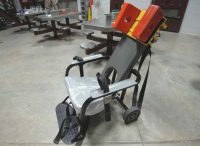News Release
SASKATOON, June 17, 2015 /CNW/ – Larry Worthen, Executive Director of the Christian Medical and Dental Society of Canada (CMDS), urged the College of Physicians and Surgeons of Saskatchewan (CPSS), today, to support freedom of conscience when they meet on Friday, June 19th, to consider a policy on conscientious objection. CMDS and other doctors’ groups are asking for a meeting with the College’s drafting committee to express their concerns.
Said Larry Worthen, “To ask physicians to act against deeply held moral convictions would be a clear infringement on physicians’ rights to the Section 2 fundamental freedoms of conscience and religion guaranteed by the Canadian Charter of Rights and Freedoms. The College’s Associate Registrar Brian Salte has ties to the Conscience Research Project led by one of Canada’s leading proponents of abortion, assisted suicide and euthanasia, and Mr. Salte has attended briefings of that group. We ask that the College would give us equal time to present our side of the argument and hear concerns about how this policy will affect patient care in Saskatchewan.”
Previous CPSS policy drafts required that physicians refer patients for procedures even when performing such procedures went against the moral convictions of the physician. Under the drafts, physicians would even be forced to actually perform procedures even though to do so would go against strongly held moral and religious convictions. Physicians who refused to comply would be vulnerable to sanctions up to and including losing their licences.
“No one’s interests are served by effectively disqualifying certain Saskatchewan physicians from the practice of medicine,” said Worthen.
Roman Catholic and evangelical Protestant physicians hold grave concerns about the negative effects when they are forced to act against their consciences.
“Going against one’s conscience can cause moral distress which has been shown to affect patient care adversely. We need to have physicians who are free to bring their whole selves to their patients, including their compassion and their ethics,” said Mary Deutscher, member of the Roman Catholic Diocese of Saskatoon Justice and Peace Commission. “For Catholic physicians, participation in a formal referral makes them an accomplice in the procedure. This position is supported by many evangelical Protestant experts and other groups as well.”
This is also reflected in the positions of CMDS, Canadian Physicians for Life (CPL) and the Canadian Federation of Catholic Physicians’ Societies (CFCPS).
“Should the College choose to adopt this policy, it would assume the role of judge and jury deciding who could or could not exercise their constitutionally protected rights,” said Faye Sonier, CPL’s General Legal Counsel. “Physicians who cannot perform certain procedures due to their beliefs would become a class of citizens who fall outside the protection of the Canadian Charter of Rights and Freedoms.”
“Physicians who hold conscientious objections do so with profound respect for both the well-being and the autonomy of their patients. Their conscientious objections also stem from a deep commitment to the Hippocratic Oath,” said Dr. Thomas Bouchard, M.D., of the CFCPS. “In debates about conscience rights, the debate is often framed as a competition between the rights of a patient to access services versus the conscience of a physician. But physicians in these circumstances do not care solely about their conscience rights. These physicians also care deeply about the good of their patients.”
Self-referral is already a commonly exercised option among patients, including in respect of abortion services, across most of Saskatchewan. Self-referral allows the doctor to avoid being involved in facilitating the provision of the service, and the patient gets prompt access to the service.
A public opinion survey conducted May 20th-27th by Abingdon Research indicated that when a patient and doctor have different views on best treatment because of the doctor’s moral convictions, 47.5% of the Saskatchewan public felt that a patient could seek further advice or help from a different doctor without a formal referral, compared with 44.1% who felt the doctor should provide a formal referral. More than 53% of Saskatchewan residents felt that “nothing should happen to the doctor” who was unwilling to provide a treatment or a referral for reasons of moral conviction.
“Doctors represented by our groups are willing to discuss all procedures with their patients in a caring and objective way. We simply ask that when the patient makes a decision that the doctor cannot support for moral reasons that the patient access another service provider directly,” added Dr. Sheila Harding, M.D., a Saskatoon haematologist. “I have heard of many cases where doctor and patient agree to disagree and the patient returns to the physician’s practice after the procedure. If anything, the physician-patient relationship was enhanced.”
CMDS (Christian Medical and Dental Society) represents some 1600 physicians and dentists across Canada (cmdscanada.org). The Canadian Federation of Catholic Physicians’ Societies (canadiancatholicphysicians.com) represents groups from across Canada. Canadian Physicians for Life (physiciansforlife.ca is the national association of pro-life physicians and provides resources and educational opportunities to thousands of physicians and medical students each year.
SOURCE Christian Medical and Dental Society of Canada
For further information: Larry Worthen at 902-880-2495. Larry is available for interviews in Saskatoon after 10:00 a.m., Wednesday, June 17th, until Noon, Saturday, June 20th.
